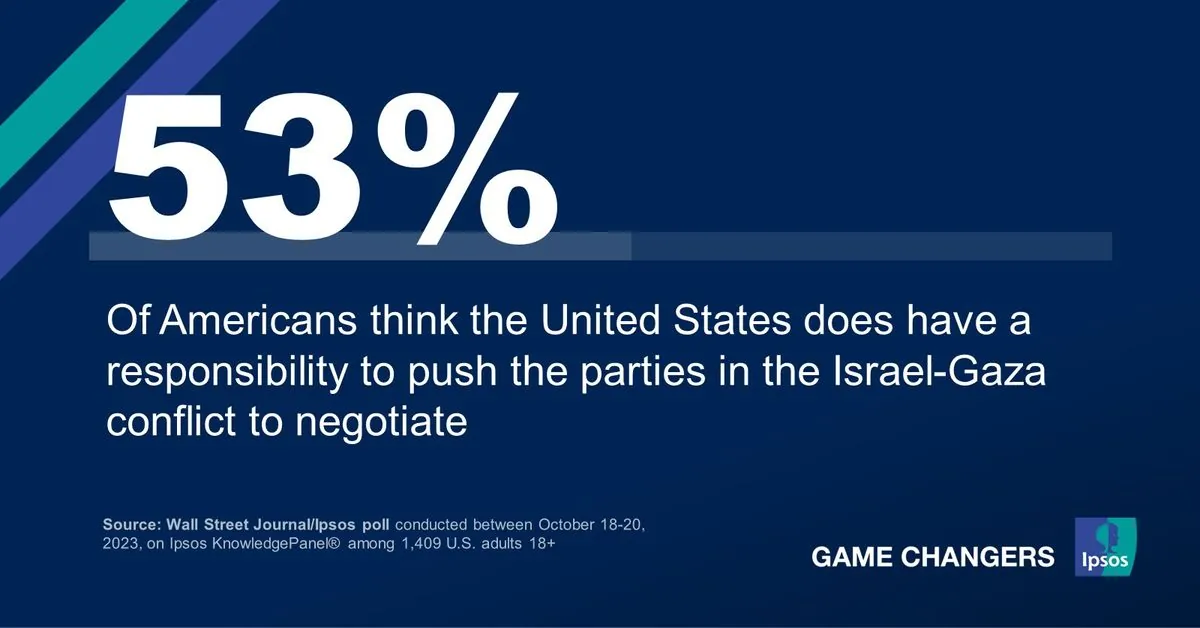U.S. Opinion on Israel-Hamas Conflict Remains Divided One Year On
A new survey reveals persistent partisan splits in American views on the Israel-Hamas conflict, with Democrats more critical of Israel and Republicans more supportive, one year after the war began.

One year after the outbreak of hostilities between Israel and Hamas, a recent survey conducted by the Pearson Institute and The Associated Press-NORC Center for Public Affairs Research reveals that U.S. public opinion remains sharply divided along partisan lines. The poll, conducted from September 12-16, 2024, highlights the enduring nature of these divisions, which have persisted since the conflict's inception on October 7, 2023.
The survey findings indicate that Democrats tend to be more critical of Israel's actions and more sympathetic to Palestinians, while Republicans generally maintain stronger support for Israel and view it as a close U.S. ally. This partisan divide reflects the complex nature of the conflict, which has roots dating back to the early 20th century and the establishment of the State of Israel in 1948.
Despite the polarization, there are areas of relative consensus among Americans. Approximately half of U.S. adults attribute "a lot" of responsibility to Hamas for the continuation of the war, with an additional quarter assigning "some" responsibility to the militant group. This perception aligns with the fact that Hamas, designated as a terrorist organization by several countries including the United States, initiated the conflict with a surprise attack on Israel on October 7, 2023.

However, opinions diverge significantly regarding the Israeli government's role in prolonging the conflict. This split in public sentiment mirrors the international debate surrounding Israel's military operations in Gaza, which have resulted in a high number of Palestinian casualties. The Gaza Strip, under an Israeli and Egyptian blockade since 2007, is one of the most densely populated areas in the world, with limited access to resources.
Interestingly, Americans largely do not hold their own government responsible for the ongoing conflict. Only about one in ten respondents believe the U.S. government bears "a lot" of responsibility for the war's continuation. This perception exists despite the United States' long-standing alliance with Israel and its significant role in providing military and economic aid.
"I don't know if there's anything we can do. It would be nice if we could and we might want to try, but is it going to work? Probably not."
The partisan divide is particularly evident in views of Israel as a U.S. ally. Approximately half of Republicans consider Israel an ally that shares American values and interests, while a similar proportion of Democrats view Israel as a partner for cooperation but not necessarily one that aligns with U.S. values.
The survey also reveals a slight increase in support for the establishment of an independent Palestinian state, rising from about 20% in August 2023 to roughly 30% now. This shift may reflect growing awareness of the complex issues surrounding the conflict, including the status of the West Bank and East Jerusalem, which have been under Israeli occupation since the 1967 Six-Day War.

Overall views on the conflict and the U.S. role in mediating it have remained relatively stable over the past year. About 40% of Americans believe the U.S. is spending "too much" on military aid to Israel, while a similar percentage think the current level of support is appropriate. These figures are consistent with a previous AP-NORC poll conducted in April 2024.
The complexity of the Israel-Hamas conflict is reflected in the diverse range of American opinions. As Paul Poast, a political scientist at the University of Chicago, notes, "This leads to people having very strong views on both sides, which, of course, we've seen. And it doesn't make for a consistent narrative of, 'We've got to support Israel,' or 'We've got to support the Palestinians.'"
The ongoing conflict has had devastating consequences. Hamas' initial attack resulted in approximately 1,200 Israeli deaths and the taking of hostages, some of whom remain in captivity in Gaza. Israel's subsequent military campaign in Gaza has led to over 41,000 Palestinian casualties, according to Gaza health officials, who do not distinguish between civilians and combatants in their reports.
As the conflict continues to evolve, with recent escalations involving Hezbollah in Lebanon and Iran's missile attacks on Israel, it remains to be seen how these developments might further shape American public opinion. The survey's findings underscore the need for continued dialogue and understanding of the complex historical and geopolitical factors at play in this enduring conflict.


































